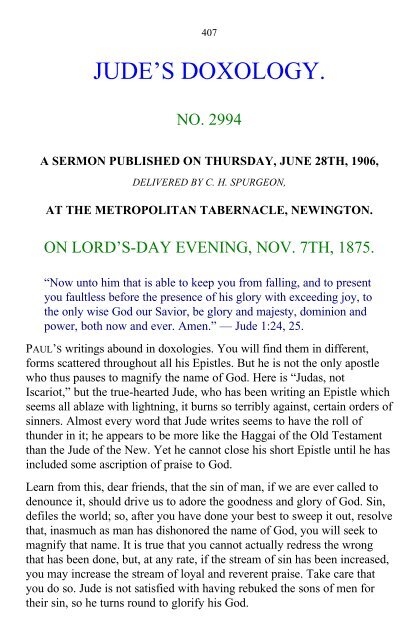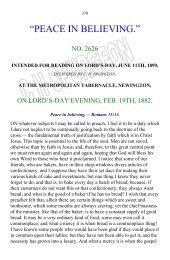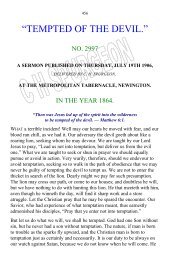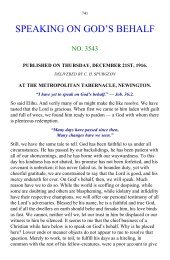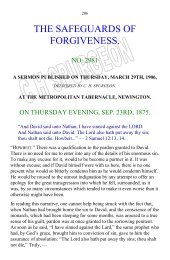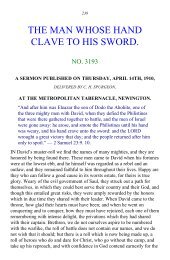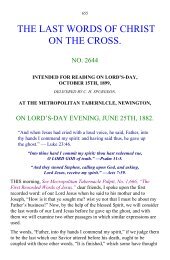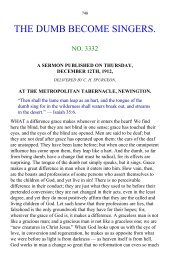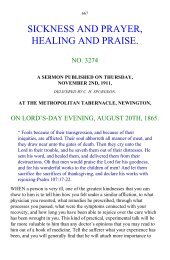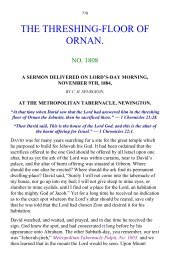JUDE'S DOXOLOGY. - APIBS Home
JUDE'S DOXOLOGY. - APIBS Home
JUDE'S DOXOLOGY. - APIBS Home
Create successful ePaper yourself
Turn your PDF publications into a flip-book with our unique Google optimized e-Paper software.
407<br />
JUDE’S <strong>DOXOLOGY</strong>.<br />
NO. 2994<br />
A SERMON PUBLISHED ON THURSDAY, JUNE 28TH, 1906,<br />
DELIVERED BY C. H. SPURGEON,<br />
AT THE METROPOLITAN TABERNACLE, NEWINGTON.<br />
ON LORD’S-DAY EVENING, NOV. 7TH, 1875.<br />
“Now unto him that is able to keep you from falling, and to present<br />
you faultless before the presence of his glory with exceeding joy, to<br />
the only wise God our Savior, be glory and majesty, dominion and<br />
power, both now and ever. Amen.” — Jude 1:24, 25.<br />
PAUL’S writings abound in doxologies. You will find them in different,<br />
forms scattered throughout all his Epistles. But he is not the only apostle<br />
who thus pauses to magnify the name of God. Here is “Judas, not<br />
Iscariot,” but the true-hearted Jude, who has been writing an Epistle which<br />
seems all ablaze with lightning, it burns so terribly against, certain orders of<br />
sinners. Almost every word that Jude writes seems to have the roll of<br />
thunder in it; he appears to be more like the Haggai of the Old Testament<br />
than the Jude of the New. Yet he cannot close his short Epistle until he has<br />
included some ascription of praise to God.<br />
Learn from this, dear friends, that the sin of man, if we are ever called to<br />
denounce it, should drive us to adore the goodness and glory of God. Sin,<br />
defiles the world; so, after you have done your best to sweep it out, resolve<br />
that, inasmuch as man has dishonored the name of God, you will seek to<br />
magnify that name. It is true that you cannot actually redress the wrong<br />
that has been done, but, at any rate, if the stream of sin has been increased,<br />
you may increase the stream of loyal and reverent praise. Take care that<br />
you do so. Jude is not satisfied with having rebuked the sons of men for<br />
their sin, so he turns round to glorify his God.
408<br />
Observe that these doxologies, wherever we meet with them, are not all<br />
exactly the same. They are presented to the same God, and offered in the<br />
same spirit; but there are reasons given for the doxology in the one case<br />
which are not given in the other. Our morning text See Metropolitan<br />
Tabernacle Pulpit, No. 1,266, “Paul’s Doxology.” told us of what God is<br />
able to do, and so does this. They both begin with praising God’s ability;<br />
but while Paul spoke about the greatness of that ability in what it could do<br />
for us, Jude speaks of the greatness of that ability in preserving us from<br />
falling, and perfecting us so that we may be presented faultless before the<br />
presence of the glory of God. Let us, in an adoring frame of mind, think<br />
over this sublime subject.<br />
I. First, LET US ADORE HIM WHO CAN KEEP US FROM FAILING.<br />
I address myself, of course, near only to God’s own people. When shall we<br />
ever see a congregation in which it will be needless to make such a remark<br />
as that? I cannot call upon some of you to adore God for keeping you from<br />
falling; for, alas! you have not yet, learned to stand upright. God’s grace<br />
has never yet been accepted by you. You are not on the Rock of ages; you<br />
have not yet set out upon the heavenly pilgrimage. It is a wretched state for<br />
you to be in, in which you cannot worship him whom angels worship. It is<br />
a sad state of heart for any man to be in! to be excluded — self-excluded<br />
— from the general acclamations of joy in the presence of God, because<br />
you feel no such joy, and cannot, therefore, unite in such acclamations.<br />
But to the people of God, I have to say this dear brothers and sisters, we<br />
need keeping; therefore, let us adore him who can keep us. As saved souls,<br />
we need keeping from final apostasy. “Oh!” saith one, “I thought you<br />
taught us that those who are once saved shall never finally apostatize.” I do<br />
believe that doctrine, and delight to preach it; yet it is true that the saved<br />
ones would apostatize, every one of them, if the Lord did not keep them.<br />
There is no stability in any Christian, in himself considered; it is the grace<br />
of God within him that enables him to stand. I believe than the soul of man<br />
is immortal, yet not, in and of itself, but only by the immortality which,<br />
God bestows upon it from his essential immortality. So is it with the new<br />
life that is within us. It shall never perish; but it is only eternal because God<br />
continues to keep it alive. Your final perseverance is not the result of<br />
anything in yourself, but the result of the grace which God continues to<br />
give you, and of his eternal purpose which first chose you and of his<br />
almighty power which still keeps you alive. Ah, my brethren, the brightest,
409<br />
saints on earth would fall into the lowest hell if God did not keep them<br />
from falling. Therefore, praise him, O ye stars that shine in the Church’s<br />
sky, for ye would go out with a noxious smell, as lamps do for want of oil,<br />
did not the Lord keep your heavenly flame burning. Glory be unto the<br />
Preserver of his Church who keeps his loved ones even to the end!<br />
But there are other ways of falling beside falling finally and fatally. Alas,<br />
brethren! we are all liable to fall into errors of doctrine. The best-taught<br />
man, apart from divine guidance, is not incapable of becoming the greatest<br />
fool possible. There is a strange weakness which sometimes comes over<br />
noble spirits, and which makes them infatuated with an erroneous novelty,<br />
though they fancy they have discovered some great truth. Men of enquiring<br />
and receptive minds are often decoyed from the old paths, — the good old<br />
ways; and while they think they are pursuing truth, they are being led into<br />
damnable error. He only is kept, as to his thoughts and doctrinal views,<br />
whom God keeps, for there are errors that would, if it were possible<br />
deceive even the very elect; and there are men and women going about in<br />
this world, with simooth tongues and plausible arguments, who carry<br />
honeyed words upon their lips, though drawn swords are concealed behind<br />
their backs. Blessed are they who are preserved from these wolves in<br />
sheep’s clothing. Lord, thou alone canst preserve us from the pernicious<br />
errors of the times, for thou art “the only wise God our Savior.”<br />
And, dear friends, we need keeping from an evil spirit. I do not know<br />
whom I should prefer, — to see one of my dear Christian brethren fall into<br />
doctrinal error, or into an un-Christian spirit. I would prefer neither, for I<br />
think this is a safe rule, — of two evils, choose neither. It is sad to hear<br />
some people talk as if they alone are right, and all other Christians are<br />
wrong. If there is anything which is the very essence and soul of<br />
Christianity, it is brotherly love; but brotherly love seems to be altogether<br />
forgotten by these people; and other Christians, who, in the judgment of<br />
sobriety, are as earnest, and as true-hearted, and as useful as themselves,<br />
are set down as belonging to a kind of Babylonian system; — I hardly<br />
know what they do not call it, but they give it all sorts of bad names, and<br />
this is thought to be a high style of Christianity. God grant that the man<br />
may be forgiven who thought it, to be a worthy purpose of his life to found<br />
a sect, whose distinguishing characteristic should be that it would have no<br />
communion with any other Christians! The mischief that, man hast done is<br />
utterly incalculable, and I can only pray that, in the providence of God,<br />
some part of it may die with him.
410<br />
O brethren and sisters, I charge you, whatever mistakes you make, not to<br />
make a mistake about this one thing, — that, even if you have all<br />
knowledge, and have not charity, it profiteth you nothing; even if you<br />
could get a perfect creed, and knew that your modes of worship was<br />
absolutely apostolic, yet, if you also imbibed this idea that you could not<br />
worship with any other Christians, and that they were altogether outside<br />
your camp, your error would be far worse than all other errors put<br />
together, for to be wrong in heart is even worse than to be wrong in head.<br />
I would have you true to God’s truth, but, above all, I would have you true<br />
to God’s love. My brother, I think you are mistaken about this matter or<br />
that, but do you love the Lord Jesus Christ? If so, I love you. I have no<br />
doubt, that I also am mistaken about some things, but, do not therefore<br />
withdraw your hand, and say that you cannot have fellowship with me. I<br />
have fellowship with my Father who is in heaven, and with his Son, Jesus<br />
Christ, and with his blessed Spirit; and methinks that it ill becomes you, if<br />
you call yourself a son of that same God, to refuse to have fellowship with<br />
me when I have fellowship with him. God save you from this evil spirit;<br />
but, you may readily enough fall into it unless the Lord shall keep you.<br />
Your very zeal for truth may drive you into a forgetfulness of Christian<br />
love; and if it does, it will be a sad pity. O Lord, keep us from falling in this<br />
way!<br />
But there are falls of another sort which may happen to the brightest<br />
Christian; I mean, falls into outward sin. As you read Jude’s Epistle<br />
through, you will see what apostates some professors became, and you will<br />
be led to cry, “Lord, keep me from falling.” And if you were the pastor of a<br />
large church like mine, you would see enough to convince you that traitors<br />
like Judas are not all dead, — that, amidst the faithful, the unfaithful are<br />
still found, — that there are bad fish to be thrown away, as well as good<br />
fish to be kept; and every time we execute an act of discipline, — every<br />
time we have to bemoan the fall of one, who looked like, a brother, — we<br />
may thank God that, we have been kept, and may sing this doxology,<br />
“Unto him that is able, to keep us from falling, be glory and power for<br />
ever.”<br />
And, dear friends, there is a way of falling, out of which people are not so<br />
often, recovered as when they fall into overt sin; I mean, falling into<br />
negligence as to natural or Christian duties. I have known professors who<br />
have been very lax at home, — children who were not obedient to their<br />
parents, — husbands who did not love their wives as they ought, — wives
411<br />
who were quite at home at this meeting and that, but very negligent, of<br />
their domestic duties. And, mark you, where that is the case, it is a thing to<br />
mourn over, for the Christian ought to be absolutely reliable in everything<br />
he has to do. I would not give twopence for your religion if you are a<br />
tradesman, but, not fair in your dealings! I do not care if you can sing like<br />
David, or preach like Paul, if you cannot measure a yard of material with<br />
the proper number of inches, or if your scales do not weigh rightly, or your<br />
general mode of business is not straight and true, you had better make no<br />
profession of religion. The separation at what, is called “religious” from the<br />
“secure” is one of the greatest, possible mistakes. There is no such thing as<br />
a religion of Sundays, and of chapels and churches; at least, though there is<br />
such a thing, it is not worth having. The religion of Christ is a religion for<br />
seven days in the week, — a religion for every place and for every act; and<br />
it teaches men, whether they eat, or drink, or whatever they do, to do all in<br />
the name, of the Lord Jesus Christ, and to the glory of God. I pray that,<br />
you may be kept from falling away from that religion, and that, you may be<br />
kept, up to the mark in serving the Lord in all things, and attending<br />
diligently to the little commonplace, matters of daily life.<br />
And you know, dear friends, there is another sort of falling; that is, when<br />
the heart gets gradually cold, when the Christian wanders away little by<br />
little, — when the life become more or less inconsistent with the<br />
profession. Oh, how many professors get into this state! They are like<br />
people who are not as well as they used to be. They do not know when<br />
they began to feel worse; it was months ago, and every day they have got<br />
weaker, till now you can see their bones, though once they were full of<br />
flesh. Now they discover that, whereas once they could have walked ten<br />
miles without fatigue, half a mile or less wearies them. Their appetite, too,<br />
has gradually gone; they scarcely know how. Ah, these are the sick folk<br />
with whom the physician has more trouble than he has with those who are<br />
suddenly seized by some well-known disease; and that gradual decline of<br />
spiritual health, which does not come all at once, but, little by little, is one<br />
of the most perilous of evils; and we have need continually to cry, “Lord,<br />
keep us from this;” and to praise his name that he is able so to keep us.<br />
Thus I have shown you that we need keeping; and, brethren, none but the<br />
Lord can keep us. No man can keep himself; without God’s grace, he will<br />
surely fail. And no place can keep us. Some people think that, if they could<br />
get into such-and-such a family, they could keep from sin, but biley are<br />
mistaken. In every position which man occupies, he will find temptation.
412<br />
We have heard of the hermit, who hoped to get rid of all sin by living in a<br />
cave. He took with him his little brown loaf and his jug of water, but he<br />
had hardly entered the cave before he upset his jug, and spilt the water. It<br />
was a long way to the well, and he got so angry with himself for what he<br />
had done, that he soon discovered that the devil could get into a cave as<br />
quickly as he could, so he thought be might as well go back, and face the<br />
trials of ordinary society. There is a story which they tell in Scotland of a<br />
family who were thriftless, and therefore did not succeed; but they thought<br />
it was one of the “brownies” that kept them from getting out; so they<br />
decided to “flit.” They put all their things into the cart; but just as they<br />
were about to start, they heard a noise that made them cry out, “The<br />
brownie is in the churn;” so, wherever the churn went, the brownies would<br />
go too. And you may remove wherever you like, and think, “If I get, into<br />
such a position, I shall escape from temptation, but you will find that, “the<br />
brownie is in the churn still, and he will follow you wherever you may go.<br />
You cannot be kept from falling by choosing another situation. You had<br />
better stop where you are brother, and fight the devil there, for perhaps the<br />
next place that you select as the scene of combat may not be as suitable as<br />
the one you have now.<br />
“Ah!” says one, “I wish I could get to<br />
“‘A lodge in some vast wilderness,<br />
Some boundless contiguity of shade<br />
Where rumor of oppression and deceit,<br />
Of unsuccessful or successful war,<br />
Might never reach me more.’”<br />
Yes, yes; but that is not the way to conquer sin, is it? Suppose the battle of<br />
Waterloo is just beginning, and here is a soldier who wants to win a<br />
victory; so he runs away, — gets off to Brussels, and hides himself in a<br />
cellar! Is he likely to be numbered among the heroes of the day? No,<br />
brethren; and if there is any sin to be overcome in this world, there is no<br />
credit to the man who says, “I’m going to hide somewhere out of the<br />
world.” No, no, my rother; accept the lot that, God has provided for you;<br />
take your mace in the ranks of his soldiers; and whatever temptation<br />
comes, look up to him who is able to keep you from falling, but do not<br />
dream, of running away, for that is the way to fall, that is being dedicated<br />
before the battle begins. Nobody but God can keep you. You may join<br />
whatever church you like; you may wear a hat with a broad brim, and say<br />
“thou” and “thee”; you may meet with those who break bread, and preach
413<br />
nothing but the gospel of the grace of God; you may dwell amongst the<br />
best people who ever lived; but you will still be tempted. Neither place nor<br />
people, neither manners nor customs can keep you from falling; God alone<br />
can do it.<br />
But here is the mercy, God can do it. Notice how Jude’s doxology puts it:<br />
“To the only wise God our Savior.” It is because he alone is wise that he<br />
alone is able to keep us from falling. He does it by teaching us the truth, by<br />
warning us against secrets in and by his providential leading. Sometimes,<br />
he keeps temptation from us; at other times, he allows a temptation to<br />
come to us that, by overcoming it, we may be the stronger to meet another<br />
one. Oftentimes, he delivers us from temptation by letting affliction come<br />
upon us. Many a man has been kept from falling into sin by being stretched<br />
upon a head of sickness. Had it not been for the loss of the eye, he would<br />
have looked upon vanity. Had it not been for that broken bone, he would<br />
have run in the ways of ungodliness. We little know how much<br />
preservation from falling we owe to our loss and crosses. The story of Sir<br />
James Thornhill painting the inside of the cupola of St. Paul’s is probably<br />
well known to you. When he had finished one of the compartments, he was<br />
stepping backward that he might get a full view of it, and so went almost<br />
to the edge of the scaffolding, and would have fallen over if he had taken<br />
another step; but a friend, who saw his danger, wisely seized one of his<br />
brushes, and rubbed some paint over his picture. The artist, in his rage,<br />
rushed forward to save his painting, and so saved his own life. We have all<br />
pictured life; what a fairy picture we made of it; and as we admired it, we<br />
walked further and yet further away from God and safety, and got nearer<br />
and yet nearer to perilous temptation, when trial came, and ruined the<br />
picture we had painted; and then, though scarcely knowing why, we came<br />
forward and were saved. God had kept us fron falling by the trouble he had<br />
sent to us.<br />
God has often kept us from falling by a bitter sense of our past sin. We<br />
have not dared to go near the fire again, for our former burns have scarcely<br />
healed. I have also noticed, in my own case, that when the desire for sin<br />
has come with force, the opportunity for sin has not been present; and<br />
when the opportunity of evil has been present, then the desire has been<br />
absent. It is wonderful how God prevents these two things from meeting,<br />
and so keeps his people from falling.
414<br />
Above all, it is by the Divine Spirit that God hears us up as upon eagle’s<br />
wings. The Spirit teaches us to hate sin, and to love righteousness, and so<br />
we are daily kept from failing.<br />
Brethren, join with me in adoring the Lord that he will keep us to the end.<br />
Have we committed our souls into the hands of Jesus? Then, our souls are<br />
safe for ever. Are we trusting to him to keep us till the day of his<br />
appearing? If so, he will keep us; not one sheep or lamb out of his flock<br />
shall by any possibility be destroyed by the wolf, or the bear, or the roaring<br />
lion of hell. They shall all be his in the day when they pass again under the<br />
hands of him that telleth them.<br />
II. NOW, SECONDLY, LET US ADORE HIM BECAUSE WE WILT, AT THE<br />
LAST, PRESENT US “FAULTLESS BEFORE THE PRESENCE OF HIS GLORY<br />
WITH EXCEEDING JOY.”<br />
There will come a day, brethren, when he shalt either be presented in the<br />
courts of God as his courtiers, or else be driven from His judgment-seat as<br />
rebels against His authority. We look forward with the confident<br />
expectation that we shall be presented as the friends of Christ, unto God<br />
even the Father; and that is, indeed, a cause for adoring gratitude.<br />
Do you notice how Jude puts it? “To present you faultless.” There shall be<br />
none in heaven but those who are faultless. There shall by no means enter<br />
into those holy courts anything that defileth. Heaven is perfectly pure; and<br />
if you and I are ever to get there, we must be, pure as the driven snow. No<br />
taint of sin must be upon us, or else we cannot stand among the coutiers of<br />
God. His flaming throne would shoot forth columns of devouring fire upon<br />
any guilty soul that dared to stand in the courts of the Most High, if such a<br />
standing were possible. But we are impure, — impure as to our acts; and,<br />
worst of all, impure as to our very nature; how then can we hope ever to<br />
stand there? Yet, dear brethren and sisters, our confidence, is that we,<br />
shall. Why?<br />
Is it not because Christ is able to present us faultless there? Come,<br />
Christian, think for a minute how faultless Christ has made you so far as<br />
your past sin is concerned. The moment you believed in him, you were so<br />
completely washed in his precious blood that not a spot of sin remained<br />
upon you. Try to realize that, whatever your past life has been, if you now<br />
believe in Jesus Christ, you are cleansed from all iniquity by virtue of his<br />
atoning sacrifice, and you are covererd by a spotless robe of righteousness
415<br />
by virtue of his blessed life of perfect purity and obedience to his Father’s<br />
will. You are now without fault, so far as your past sin is concerned, for he<br />
has cast it all into the depths of the sea; but, you feel that, you are not<br />
without fault as to your nature.<br />
“Oh!” say you, “I feel everything that is evil rising at times within me.” But<br />
all that evil is under sentence of death. Christ nailed it to his cross.<br />
Crucifixion is a lingering and very painful death, and the culprit struggles<br />
ere he breathes his last; but your sins have had their death-blow. When<br />
Christ was nailed to the cross, your sins were nailed there too, and they<br />
shall never come down again. Die they must, even as he died. It will be a<br />
blessed hour when sin shall at last give up the ghost, — when there shall be<br />
not even the tendency to sin within our nature. Then shall we be presented<br />
faultless before the throne of God.<br />
“Can that ever be done?” asks one. Well may you ask that question,<br />
brother. Can it ever be that, we shall not be tempted by one foul lust, nor<br />
be disturbed by one unbridled passion, nor feel the emotions of envy or of<br />
pride again? Yes, it shall surely be. Christ has secured this blessing to you.<br />
His name is Jesus, Savior, “for he shall save his people from their sins.” He<br />
must and will do this for all who trust him. Rejoice that he will do this, for<br />
no one but God can do it. It must be “the only wise God our Savior” who<br />
can accomplish this; but accomplish it he will. Does your faith enable you<br />
to picture yourself as standing before the throne of God faultless? Well<br />
then, give to the Lord the glory which is due unto him for such a wondrous<br />
act of grace as that.<br />
This is how you are to be presented by Christ, in glory. There is a great stir<br />
in a family when a daughter is to be presented at court, and a great deal is<br />
thought of it; but, one day, you and I, who have believed in Jesus, shall be<br />
presented to the Father. What radiant beauty shall we then wear when God<br />
himself shall look upon us, and declare us to be without fault; — when<br />
there shall be no cause for sorrow remaining, and therefore we shall be<br />
presented with exceeding joy! It shall be so, my brother; it shall be so, my<br />
sister; therefore do not doubt it. How soon it shall be, we cannot tell;<br />
possibly, tomorrow. Perhaps, ere the sun rises again, you and I may be<br />
presented by Christ “before the presence of his glory with exceeding joy.”<br />
We cannot tell when it will be, but we shall be there in his good time. We<br />
shall be perfect; we shall be “accepted in the Beloved;” and, therefore,
416<br />
“unto him be glory and majesty, dominion and power, both now and ever.<br />
Amen.”<br />
III. That is the note with which I have to close my discourse. LET US,<br />
BECAUSE OF THESE TWO GREAT BLESSINGS OF FINAL PRESERVATION AND<br />
PRESENTATION BEFORE HIS GLORY, OFFER UNTO THE LORD OUR HIGHEST<br />
ASCRIPTIONS OF PRAISE.<br />
Jude says, “Both now and ever.” Well, we will attend to the “ever” as<br />
eternity rolls on; but let us attend to the praise of God “now” — at this<br />
moment: “To the only wise God our Savior be glory and majesty, dominion<br />
and power now. Come, brethren and sisters, think of what you owe to him<br />
who has kept you to this day, and will not let you go. Think of where you<br />
might have been; and think, I may say, of where you used to be, in your<br />
unregenerate state. Yet you are not there now; but here you are, without<br />
selfrighteousness, made to differ from your fellowmen, entirely through the<br />
grace of God. You have been kept perhaps twenty years; thirty years, forty<br />
years, — possibly, fifty years. Well, unto him be the glory; give him the<br />
glory even now.<br />
How can you do it? Well, feel it in your hearts; speak of it to your<br />
neighbors; talk of it to your children. Tell everybody you meet what a good<br />
and blessed and faithful God he is, and so give him glory now. And be<br />
happy and cheerful; you cannot glorify God bettcr than by a calm, quiet,<br />
happy life. Lat the world hlow that you serve a good Master. If you are in<br />
trouble, do not let anyone see that the trouble touches your spirit; — nay,<br />
more, do not let it trouble your spirit. Rest in God; take evil as well as<br />
good from his hand, and keep on praising him. You do not know how<br />
much good you may do, and how greatly you may glorify God, if you<br />
praise him in your dark times. Worldlings do not care much about our<br />
psalm-singing unless they see us in pain and sorrow, and observe that we<br />
praise God then. I like, and the world likes, a religion that will wash, — a<br />
religion that will stand many shows, and much rough usage. Some<br />
Christians’ joy disappears in the wear and tear of life; it cannot endure the<br />
world’s rough handling.<br />
Let it not be so with us, beloved; but let us praise, and bless, and magnify<br />
the name of the Lord as long as we have any being.<br />
I know that, in speaking thus, I am only addressing a part of my<br />
congregation. I wish that every man and woman here were now praising
417<br />
the Lord, and I am sure that you could not have a better occupation to all<br />
eternity. Remember that, if you do not praise God, it is impossible for you<br />
ever to enter heaven, for that is the chief occupation of heaven; and<br />
remember also that praise from your lips, until those lips are divinely<br />
cleansed, would be like a jewel in a swine’s snout, a thing altogether out of<br />
place. For you, dear unsaved hearer, the first thing is, not praise, but<br />
prayer, — nay, not even prayer first, but faith. “Believe in the Lord Jesus<br />
Christ, and thou shalt be saved;” and then, in faith, pray the prayer which<br />
God accepts. But, thou must first, believe in Jesus. “And what does<br />
believing in Jesus mean?” thou askest. It means this: thy sin deserves<br />
punishment, for God, who is just, must punish sin. But his Son came into<br />
the world to suffer in the stead of those who trust him; and now, God can<br />
be just, and yet, the Justifier of every soul that believes in Jesus. In the<br />
person of his Son, God hangs upon a tree, and dies a felon’s death; wilt<br />
thou believe in the merit of that death, and in the love of God, who spared<br />
not, his own Son in order that he might spare us? Canst thou trust Jesus as<br />
thy God and Savior? Wilt thou do it now? Then thou art saved. The first<br />
moment of thus trusting God is the beginning of a new life, — a life which<br />
will drive out the old death of sin. The moment that thou dost thus trust<br />
thy God, thou wilt be placed upen a new footing with regard to him, thy<br />
whole aspect towards God will be changed. Repentance will take such<br />
possession of thy spirit that thou wilt be actuated by new motives, and<br />
swayed by new desires; in fact, thou wilt be a new man in Christ Jesus.<br />
This is being saved, — saved from the love of sin, saved from returning to<br />
sin, saved from falling, and so completely saved that Christ shall one day<br />
present thee “faultless before the presence of his glory with exceeding joy.”<br />
May God do this for every one of you, my hearers, according to the riches<br />
of his grace! It is my heart’s last, best, and strongest desire that every one<br />
of you may be saved. May we all meet in heaven, before the throne of God,<br />
never more to be parted! While I am away, listen with all earnestness to<br />
othe Heralds of the cross, and pray the Lord to bless their messages to<br />
your salvation, if mine have not been so blest. I pray that, by some<br />
instrumentality, you may all be saved in the Lord with an everlasting<br />
salvation. Amen.<br />
EXPOSITIONS BY C. H. SPURGEON.<br />
THE GENERAL EPISTLE OF JUDE.
Verse 1. Jude.<br />
That is to say Judas, not Iscariot, —<br />
418<br />
1. The servant of Jesus Christ, and brother of James, —<br />
He does not say, “and brother of our Lord,” for we know that James and<br />
Judas were both of them among the Lord’s kinsman according to the flesh;<br />
but now, after the flesh, knoweth he even Christ no more, but is content<br />
and happy to be known as “the servant of Jesus Christ, and brother of<br />
James,” —<br />
1. To them that are sanctified by God the Father,<br />
For the decree of election, the setting apart of the chosen is usually<br />
ascribed unto God the Father.<br />
1. And preserved in Jesus Christ, and called:<br />
We have here a very blessed description of the whole work of our<br />
salvation, — set apart by the Father, joined unto Christ, and preserved in<br />
him, and then, in due time, called out by the Spirit of God.<br />
2. Mercy unto you, and peace, and love, be multiplied.<br />
Christian letters should be full of love and good will. The Christian<br />
dispensation breathes beneficence, it is full of benediction: “Mercy unto<br />
you, and peace, and love, be multiplied.” May the Divine Trinity give you a<br />
trinity of blessings!<br />
3. Beloved, when I gave all diligence to write unto you of the common<br />
salvation, it was needful for me to write unto you, and exhort you that you<br />
should earnestly contend for the faith that was once delivered unto the<br />
saints.<br />
In the sense of being once for all given to the saints, the faith of Chistians is<br />
not a variable quantity. It is not a thing which changes from day to day, as<br />
some seem to suppose, vainly imagining that fresh light is bestowed upon<br />
each new generation. No, the truth was delivered once for all, it was<br />
stereotyped, fixed; and it is for us to hold it fast as God has given it to us.<br />
4. For there are certain men crept in unawares, —<br />
They did not boldly avow their heresy when they came in; — they would<br />
not have been allowed to enter if they had done so, — but they sneaked in,
419<br />
they climbed into the pulpit, professing to be preachers of the gospel, when<br />
they knew, all the while, that they intended to undermine it. Basest of all<br />
men are those who act thus: “There are certain men crept in unawares,” —<br />
4. Who were before of old ordained to this condemnation,<br />
Proscribed by God as traitors long ago. Those who have not the courage<br />
of their convictions probably have no convictions at all, but seek to<br />
undermine the faith which they profess to hold.<br />
4. Ungodly men, turning the grace of our God into lasciviousness, and<br />
denyiny the only Lord God, and Our Lord Jesus Christ.<br />
Antinomians, “turning the grace of our God into lasciviousness,” falsely<br />
declaring that the law has no binding force upon the Christian’s life, and<br />
saving that we may do evil that good may come; — and Socinians,<br />
“denying the only Lord God, and our Lord Jesus Christ.”<br />
5. I will therefore put you in remembrance, though ye once knew this, how<br />
that the Lord, having saved the peoyle out of the land of Egypt, afterward<br />
destroyed them that believed not.<br />
If we have no real faith, we may appear to go a long way towards heaven,<br />
but we shall not enter the heavenly Canaan.<br />
6. And the angels which kept not their first estate, but left their own<br />
habitation, he hath reserved in everlasting chains under darkness unto the<br />
judgment of the great day.<br />
See, then the need of stability, the need of abiding in the faith, and abiding<br />
in the practice of it, lest we should turn out to be like the Israelites, who,<br />
though they came out of Egypt, left their carcasses in the wilderness, or<br />
like the angels, who, though they once stood in God’s presence in glory,<br />
have fallen to the deeps of the abyss because of their apostasy.<br />
7, 8. Even as Sodom and Gomorrha, and the cities about them in like<br />
manner, giving themselves over to fornication, and going after strange<br />
flesh, are set forth for an example, suffering the vengeance of eternal fire.<br />
Likewise also these filthy dreamers defile the flesh, despise dominion, and<br />
speak evil of dignities.
420<br />
They cast off all restraint; they claim to have liberty to do whatever they<br />
like; and when reproved, they utter railing words against those who<br />
honestly rebuke them.<br />
9. Yet Michael the archargel, when contending with the devil he disputed<br />
about the body of Moses, durst not bring against him a railing accusation,<br />
but said, The Lord rebuke thee.<br />
To what does this refer? I am sure I do not know. I cannot think it refers to<br />
anything recorded in the Old Testament, but to some fact, known to Jude,<br />
who here speaks by revelation, and records it. We believe it, and learn from<br />
it that, when an archangel disputes with the devil, he does not use hard<br />
words even against him, for hard words are an evidence of the weakness of<br />
the cause which they are used to support. Hard arguments softly put, are<br />
the really effective weapons, but it takes some of us a long time to learn<br />
this; and generally, in our younger days, we wear away our own strength<br />
by the violence with which we use it.<br />
10. But these speak evil of those things which they know not: but what they<br />
know naturally, as brute beasts, in those things they corrupt themselves.<br />
It is a horrible thing when a man’s sin goes the full length of his<br />
knowledge, and he sins up to the degree of his possibilities.<br />
11, 12. Woe unto them! for they have gone in the way of Cain, and ran<br />
greedily after the error of Balaam for reward, and perished in the<br />
gainsaying of Core. These are spots —<br />
“These are spoilers,” so it may be rendered.<br />
12. In your feasts of charity,<br />
They spoil your love feasts at the communion table, they mar your<br />
fellowship when you gather together for worship.<br />
12. When they feast with you, feeding themselves without fear.<br />
Some of the best Christians, who come to the Lord’s table, come there in<br />
great fear and trembling; and I have known some, who have had an<br />
undoubted right to be there, half afraid to come. Yet those very persons<br />
who have a holy fear lest they should come amiss, are those who really<br />
ought to come. “Feeding themselves without fear” is the mark of those<br />
who are further off from God.
421<br />
12. Clouds they are without water, carried about of winds.<br />
They believe according to what is said to them by the last man who speaks<br />
to them; they are easily persuaded to this doctrine, and to that, and the<br />
other.<br />
12. Trees whose fruit withereth, without fruit,<br />
They seem to be bearing fruit, but it drops off before it ripens.<br />
12, 13. Twice dead, plucked up by the roots; raging waves of the sea, —<br />
They have nothing to say for Christ, yet they must say something, so they<br />
are “raging waves of the sea,” —<br />
13. Foaming out their own shame, wandering stars, to whom is reserved<br />
the thickness of darkness for ever.<br />
These are the false professors of religion, the members of the church for<br />
whom there are seats reserved in hell. This is a dreadful thought: “to whom<br />
is reserved the blackness of darkness for ever;” — not for the heathen, not<br />
for the open refusers of the gospel, but for such as creep into the churches<br />
unawares, teach false doctrine, live unholy lives.<br />
14, 15. And Enoch also, the seventh from Adam, prophesied of these,<br />
saying, Behold, the Lord cometh with ten thousand of his saints, to<br />
execute judgment upon all, and to convince all that are ungodly among<br />
them of all their ungodly deeds which they have ungodly committed, and<br />
of all their hard speeches which ungodly sinners have spoken against him.<br />
How Jude knew that Enoch said that, I cannot tell; it is another instance of<br />
inspiration.<br />
16. These are murmurers, complainers,<br />
You know the sort of people alluded to here, nothing ever satisfies them.<br />
They are discontented even with the gospel. The bread of heaven must be<br />
cut into three pieces, and served on dainty napkins, or else they cannot eat<br />
it; and very soon their soul loatheth even this light bread. There is no way<br />
by which a Christian man can serve God so as to please them. They will<br />
pick holes in every preacher’s coat; and if the great High Priest himself<br />
were here, they would find fault with the color of the stones of his<br />
breastplate.
422<br />
16-19. Walking after their own lusts; and their mouth speaketh great<br />
swelling words, having men’s persons in adjuration because of advantage.<br />
But, beloved, remember ye the words which were spoken before of the<br />
apostles of our Lord Jesus Christ now that they told you there should be<br />
mockers in the last time, who should talk after their own ungodly lusts.<br />
These be they who separate themselves, sensual, having not the Spirit.<br />
People who must, if they make a profession of religion at all, be continually<br />
breaking up churches, and holding themselves aloof from others, having no<br />
fellowship with anybody but those who can say “shibboleth” as plainly as<br />
they can, and sound they pretty loudly.<br />
20-22. But the beloved, building up yourselves on your most holy faith,<br />
praying in the Holy Ghost, keep yourselves in the love of God, looking for<br />
the mercy of our Lord Jesus Christ unto eternal life. And of some have<br />
compassion, making a difference:<br />
Some of those professors, who are not living consistently with their<br />
profession, in whom you can see signs and tokens of sin, yet there may be<br />
some trace of repentance, some reason to hope that they will forsake the<br />
evil when they see it to be evil: “have compassion” upon them.<br />
23. And others save with fear, pulling them out of the fire; hating even the<br />
garment spotted by the flesh.<br />
When you have to deal with unclean professors, there must be an<br />
abhorrence and detestation of their sin even when there is great gentleness<br />
towards the sinner. We must never be such believers in the repentance of<br />
the guilty as to be willing to wink at sin; for sin is a great evil in any case,<br />
and repentance cannot wipe it away; and though it behoves us to be tender<br />
to the sinner, we must never be tender to the sin.<br />
How beautifully this short and sad Epistle ends! Having described the many<br />
who, after making a profession, yet turn aside, Jude bursts out with this<br />
jubilant doxology: —<br />
24, 25. Now unto him that is able to keep you from falling, and to present<br />
you faultless before the presence of his glory with exceeding joy, to the<br />
only wise God our Savior, be glory and majesty, dominion and power,<br />
both now and ever. Amen.
423<br />
HYMNS FROM “OUR OWN PRAYERBOOK” — 441, 245, 160.


